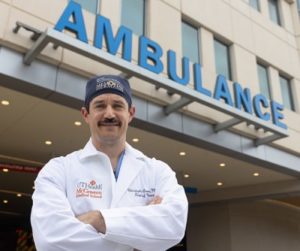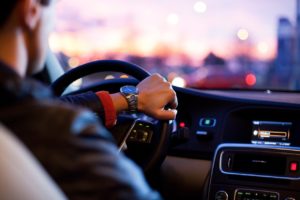Increased ridesharing results in fewer car accidents and drunk driving, new study says

Christopher Conner, M.D., Ph.D.
The increased use of ridesharing apps was linked to a decrease in motor vehicle collisions and impaired driving convictions in Houston, according to a new study by The University of Texas Health Science Center at Houston.
The research is timely as more individuals are using ridesharing apps, said Christopher Conner, MD, PhD, neurosurgery resident at the university’s McGovern Medical School and the study’s lead author.
“Automobile accidents are the leading cause of death and disability among young people, so anything we can do to reduce those incidents is going to have a massive effect,” he said.
The study found that rideshare volume had a significant correlation with the incidence of motor vehicle-related trauma, with a reduction in the rate of incidence by one-third for every 1,000 rides.
The rate continued to drop as more rides occurred. The age group with the most significant decrease in motor vehicle-related trauma were those under the age of 30, with a reduction rate of almost 39 percent, according to the study.
 Impaired driving convictions also reduced in the years following the introduction of Uber into Houston. Before 2014, there were an average of 22.5 impaired driving convictions in Houston daily. After 2014, when Uber entered the market, impaired driving convictions decreased to an average of 19 per day.
Impaired driving convictions also reduced in the years following the introduction of Uber into Houston. Before 2014, there were an average of 22.5 impaired driving convictions in Houston daily. After 2014, when Uber entered the market, impaired driving convictions decreased to an average of 19 per day.
“I think this was the biggest takeaway from the study. The data shows that ridesharing companies can decrease these incidents because they give young people an alternative to driving drunk,” Conner said.
Indeed, ridesharing offers another option proven to reduce risk of an impaired driving conviction, injury or death, he said.
The greatest number of motor vehicle collisions in Houston occurred on Friday and Saturday nights between 9 p.m. and 3 a.m. Comparing the date from before and after 2014 revealed an almost 24 percent decrease in motor vehicle collision traumas and the number of impaired driving convictions during those hours, the study said.
Both Uber and competitor Lyft have had “impressive” market penetration in Nashville, said Stanton Higgs, business operations director for TMA, which offers a range of commuter benefits such as flex scheduling, and operates VanStar.
“It is no coincidence that the city that knows how to throw a party just about every night of the week is full of rideshare Uber and Lyft drivers ready to get folks back to their hotel or home,” he said.
“What’s it worth? In my opinion, at the moment, it is priceless. There is nothing more important than saving a life,” Higgs said. “I applaud the disruptive technology of these rideshare companies that created better and safer options for people getting home safely after a fun night out.”
“Rideshare companies listed as TNCs (Transportation Network Company) such as Uber and Lyft are somewhat controversial in our industry as they generally increase congestion and do not decrease the number of vehicles in urban downtown areas,” Higgs said. “There is no doubt that their impact on access to mobility through their mobile app platform has been game changing for the consumer.”
For the study, researchers collected data from:
- Rideshare app companies that were in Houston as early as 2014, on their utilization rates.
- The two Level 1 trauma centers in Houston on patients admitted as a result of a motor vehicle accident.
- The Harris County District Attorney’s Office on impaired driving convictions, limited to cases resulting in a conviction or probation.
